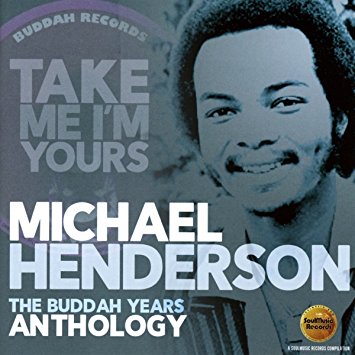Michael Henderson - Take Me I'm Yours: the Buddah Years Anthology
Michael Henderson needed an anthology like Take Me I’m Yours: The Buddah Years, a two-CD retrospective released by SoulMusic Records. Music fans, especially those around from 1976 to 1983 when Henderson released the albums that contained these songs, needed this anthology as well.
That’s because Henderson may be one of that generation’s under-appreciated vocalists and songwriters. Musicians definitely appreciated Henderson’s work on the bass, and that explains why he worked with Stevie Wonder, The Dramatics, Miles Davis, The Four Tops, Martha Reeves & the Vandellas, Gladys Knight & the Pips, to name a few.
Michael Henderson - Take Me I'm Yours: the Buddah Years Anthology
Michael Henderson needed an anthology like Take Me I’m Yours: The Buddah Years, a two-CD retrospective released by SoulMusic Records. Music fans, especially those around from 1976 to 1983 when Henderson released the albums that contained these songs, needed this anthology as well.
That’s because Henderson may be one of that generation’s under-appreciated vocalists and songwriters. Musicians definitely appreciated Henderson’s work on the bass, and that explains why he worked with Stevie Wonder, The Dramatics, Miles Davis, The Four Tops, Martha Reeves & the Vandellas, Gladys Knight & the Pips, to name a few.
Henderson grew up in Detroit, so had that Motown influence. Hearing James Jamerson, the legendary bassist for Motown’s house band the Funk Brothers, inspired Henderson to learn the instrument. Soon, he was a teenager playing with Stevie and other Motown acts. Miles heard Henderson and recruited him to be a part of his great fusion band of the 1970s.
So, Henderson entered the mid to late 1970s with being a sideman and session musician as his claim to fame. He was also writing songs, but the public had little evidence that Henderson possessed a melodic and rangy tenor that could easily extend into falsetto territory. That became apparent when Henderson joined up with Norman Connors in the mid-1970s.
Henderson wrote “Valentine Love,” but he had no intention of being the lead singer. Henderson said he sang in the studio thinking that he was giving Connors and his crew and idea of how the vocals would sound. However, Connors kept Henderson’s vocals and added Jean Carn to complete the duet and the rest was history. Henderson had a hit, and a song that eternally remains on Valentine’s Day playlists.
Henderson spent the next decade creating crafting and singing lead on other ballads that became Quiet Storm mainstays, and having all of those tunes featured on this compilation makes it a necessary purchase for fans of soulful ballads. The record shows that Henderson shines as a duet partner with Phyllis Hyman on “We Both Need Each Other” and “Can’t We Fall in Love Again,” Roberta Flack on “At the Concert,” Rena Scott on “Take Me I’m Yours,” and Carn on the aforementioned “Valentine Love.”
His work as a solo balladeer is represented on several tracks, including “You Are My Starship” and “Be My Girl.” The SoulMusic Records anthologies always contain a surprise or two, and here listeners get to hear Henderson’s take on two classic covers –Jackie Wilson’s “To Be Loved” and “Make It Easy on Yourself,” which first became a hit for Jerry Butler. Henderson is especially strong on “Make It Easy for Yourself,” where his range allows him to capture the cut’s melodrama and pathos.
Henderson’s career coincided with the height of the funk era, the record includes several of his popular up-tempo numbers such as “Wide Receiver,” “Prove It,” and well-regarded album tracks such as the funk/rock fusion, “Time.” Henderson said that he wanted to do something other than ballads at a time when funk and the emerging hip-hop genre were changing the industry. He happened to be watching a football game at the time – the AFC Championship game between the Houston Oilers (now Tennessee Titans) and the Pittsburgh Steelers and came up with the song “Wide Receiver.” “Wide Receiver” and “Prove It,” two songs that address the darker, football player as cattle themes that have emerged in recent years, actually remain relevant today. “Wide Receiver” was released 38 years ago, and we still can’t seem to figure out what a catch is.
“Valentine Love” was released as a Norman Connors song when it came out in 1975-76, as was “You Are My Starship,” and it took a little while for Henderson to get his deserved credit as a vocalist in his own right. However, Take Me I’m Yours: The Buddah Years anthology serves as a reminder that there weren’t too many R&B balladeers who did it better than Henderson. Strongly Recommended.
By Howard Dukes

